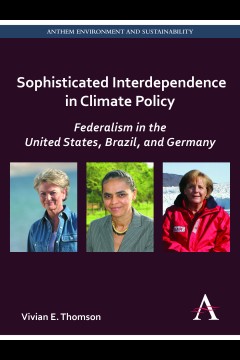Since the Kyoto Protocol’s signing in 1997 the United States has been the world’s most prominent climate change outlaw. In the United States, air pollution policymaking starts and ends with the states, whose governmental units implement federal programs.
But we find ourselves in uncharted waters in the United States when it comes to state–federal relations in climate change: many states have developed climate change and renewable energy policies ahead of the national government, and lacking an overarching climate change law, the US Environmental Protection Agency is preparing to employ a little-used part of the Clean Air Act – which revolves around state plans rather than uniform national standards – to regulate greenhouse gas emissions from large stationary sources like power plants.
Taking on these challenges, Thomson proposes a framework for climate change policy in the United States called “sophisticated interdependence” that will help foster the coalition-building so desperately needed in the US climate change arena. This framework rests on a nine-state analysis of state-level economic and political forces in the United States and on comparative descriptions of climate change and renewable energy programs in Germany and Brazil, both strong federal democracies and key players in the global climate change policy arena.
“In this engaging and carefully researched book, Vivian E. Thomson offers a politically astute roadmap for reducing our dependency on fossil fuels. Even when tackling a global problem like climate change, national and local institutions are as relevant as ever.” —Paul F. Steinberg, Professor of Political Science and Environmental Policy, Malcolm Lewis Chair in Sustainability and Society, Harvey Mudd College
“Through elaborated interconnections and an in-depth view, Thomson provides unique insights, skillfully identifying common ground and pivotal factors to break today’s stalemates in multilateral environmental agreements. Readers, regardless of their political views, will find much to stimulate their thinking in this book.” —Oswaldo Lucon, Professor, University of São Paulo, and Climate Change Adviser, São Paulo State Government
“Packed with climate law and policy insights, this book’s most notable scholarly contribution is in illuminating conditions and motives associated with US state climate activism during periods of federal inaction. Thomson provides rich material for scholars, policymakers, and anyone interested in the policy challenges posed by climate change.” —William W. Buzbee, Professor of Law, Emory University, and author of “Fighting Westway: Environmental Law, Citizen Activism, and the Regulatory War that Transformed New York City”
Vivian E. Thomson is an associate professor in the Departments of Environmental Sciences and Politics at the University of Virginia.
Anthem Sustainability and Risk Series
Anthem Environment and Sustainability Initiative
Acknowledgments; Tables and Figures; Introduction: The World’s Most Prominent Climate Change Outlaw; Chapter 1: Climate Change Contradictions in the United States; Chapter 2: Constraints and Opportunities: Forces Affecting State-Level Climate and Energy Programs; Chapter 3: Germany: “Wir Stehen Früher Auf” (We Wake Up Earlier); Chapter 4: Brazil: No More “Complexo de Vira-Lata” (Mongrel Complex); Chapter 5: Sophisticated Interdependence; Notes; Bibliography; Index
No links for this title.
No Podcasts for this title.



